2003 年 6 月英语六级真题及答案
Part I Listening Comprehension (20 minutes)
Section A
Directions: Inthissection,youwillhear10shortconversations.Attheendofeach
conversation, a question will be asked about what was said—Both the
conversationandthequestionwillbespokenonlyonce.Aftereachquestion
therewillbeapause.Duringthepause,youmustreadthefourchoicesmarked
A), B), C) and D), and decide which is the best answer. Then mark the
corresponding letter on the Answer Sheet with a single line through the
centre.
Example:
You will hear:
You will read:
A) 2 hours.
B) 3 hours.
C) 4 hours.
D) 5 hours.
From the conversation we know that the two are talking about some work they will
start at 9 o’clock in the morning and have to finish at 2 in the afternoon. Therefore,
D) “5 hours” is the correct answer. You should choose [D] on the Answer Sheet and
mark it with a single line through the centre.
Sample Answer [A] [B] [C] [D]
1.
A) Riding a horse.
B) Shooting a movie.
C) Playing a game.
D) Taking a photo.
2.
A) She’ll type the letter for the man.
B) She’ll teach the man to operate the computer.
C) She doesn’t think his sister is a good typist.
D) She thinks the man should buy a computer.
3.
A) John can share the magazine with her.
B) She wants to borrow John’s card.
C) She’ll let John use the journal first.
�
D) John should find another copy for himself.
4.
A) She promised to help the man.
B) She came a long way to meet the man.
C) She took the man to where he wanted to go.
D) She suggested a way out of the difficulty for the man.
5.
A) The train seldom arrives on time.
B) The schedule has been misprinted.
C) The speakers arrived at the station late.
D) The company has trouble printing a schedule.
6.
A) To find a better science journal in the library.
B) Not to miss any chance to collect useful information.
C) To buy the latest issue of the magazine.
D) Not to subscribe to the journal.
7.
A) She wants to borrow the man’s student ID card.
B) The tickets are less expensive than she expected.
C) She won’t be able to get any discount for the ticket.
D) The performance turned out to be disappointing.
8.
A) Do the assignments towards the end of the semester.
B) Quit the history course and choose another one instead.
C) Drop one course and do it next semester.
D) Take courses with a lighter workload.
9.
A) The organization of a conference.
B) The cost of renting a conference room.
C) The decoration of the conference room.
D) The job of cleaning up the dining-room.
10. A) Meet his client.
B) Prepare the dinner.
C) Work at his office.
D) Fix his car.
Section B
Directions: Inthissection,youwillhear3shortpassages.Attheendofeachpassage,
�
you will hear some questions. Both the passage and the questions will be
spokenonlyonce.Afteryouhearaquestion,youmustchoosethebestanswer
fromthefourchoicesmarkedA),B),C)andD).Thenmarkthecorresponding
letter on the Answer Sheet with a single line through the centre.
Passage One
Questions 11 to 13 are based on the passage you have just heard.
11. A) One of the bridges between North and South London collapsed.
B) The heart of London was flooded.
C) An emergency exercise was conducted.
D) 100 people in the suburbs were drowned.
12. A) 50 underground stations were made waterproof.
B) A flood wall was built.
C) An alarm system was set up.
D) Rescue teams were formed.
13. A) Most Londoners were frightened.
B) Most Londoners became rather confused.
C) Most Londoners took Exercise Floodcall calmly.
D) Most Londoners complained about the trouble caused by Exercise Floodcall.
Questions 14 to 16 are based on the passage you have just heard.
Passage Two
14. A) It limited their supply of food.
B) It made their eggshells too fragile.
C) It destroyed many of their nests.
D) It killed many baby bald eagles.
15. A) They found ways to speed up the reproduction of bald eagles.
B) They developed new types of feed for baby bald eagles.
C) They explored new ways to hatch baby bald eagles.
D) They brought in bald eagles from Canada.
16. A) Pollution of the environment.
B) A new generation of pest killers.
C) Over-killing by hunters.
�
D) Destruction of their natural homes.
Passage Three
Questions 17 to 20 are based on the passage you have just heard.
17. A) Whether it can be detected and checked.
B) Whether it will lead to widespread food shortage.
C) Whether global warming will speed up in the future.
D) Whether it will affect their own lives.
18. A) Many species have moved further north.
B) Many new species have come into existence.
C) Many species have developed a habit of migration.
D) Many species have become less sensitive to climate.
19. A) Storms and floods.
B) Disease and fire.
C) Less space for their growth.
D) Rapid increase of the animal population.
20. A) They will gradually die out.
B) They will be able to survive in the preserves.
C) They will have to migrate to find new homes.
D) They will face extinction without artificial reproduction.
Part II Reading Comprehension (35 minutes)
Directions: There are 4 passages in this part. Each passage is followed by some
questionsorunfinishedstatements.Foreachofthemtherearefourchoices
markedA),B),C)andD).Youshoulddecideonthebestchoiceandmarkthe
corresponding letter on the Answer Sheet with a single line through the
centre.
Passage One
Questions 21 to 25 are based on the following passage.
In the villages of the English countryside there are still people who remember the
good old days when no one bothered to lock their doors. There simply wasn’t any crime
to worry about.
Amazingly, these happy times appear still to be with us in the world’s biggest
community. A new study by Dan Farmer, a gifted programmer, using an automated
�
investigative program of his own called SATAN, shows that the owners of well over half
of all World Wide Web sites have set up home without fitting locks to their doors.
SATAN can try out a variety of well-known hacking (黑客的) tricks on an Internet
site without actually breaking in. Farmer has made the program publicly available, amid
much criticism. A person with evil intent could use it to hunt down sites that are easy
to burgle (闯入…...行窃).
But Farmer is very concerned about the need to alert the public to poor security
and, so far, events have proved him right. SATAN has done more to alert people to the
risks than cause new disorder. So is the Net becoming more secure? Far from it. In the
early days, when you visited a Web site your browser simply looked at the content. Now
the Web is full of tiny programs that automatically download when you look at a Web
page, and run on your own machine. These programs could, if their authors wished, do
all kinds of nasty things to your computer.
At the same time, the Net is increasingly populated with spiders, worms, agents
and other types of automated beasts designed to penetrate the sites and seek out and
classify information. All these make wonderful tools for antisocial people who want
to invade weak sites and cause damage.
But let’s look on the bright side. Given the lack of locks, the Internet is surely
the world’s biggest (almost) crime-free society. Maybe that is because hackers are
fundamentally honest. Or that there currently isn’t much to steal. Or because vandalism
( 恶意破坏) isn’t much fun unless you have a peculiar dislike for someone.
Whatever the reason, let’s enjoy it while we can. But expect it all to change,
and security to become the number one issue, when the most influential inhabitants of
the Net are selling services they want to be paid for.
21. By saying “... owners of well over half of all World Wide Web sites have set up
home without fitting locks to their doors” (Lines 3-4, Para. 2), the author means
that ________.
A) those happy times appear still to be with us
B) there simply wasn’t any crime to worry about
C) many sites are not well-protected
D) hackers try out tricks on an Internet site without actually breaking in
22. SATAN, a program designed by Dan Fanner can be used ________.
A) to investigate the security of Internet sites
B) to improve the security of the Internet system
C) to prevent hackers from breaking into websites
D) to download useful programs and information
23. Fanner’s program has been criticized by the public because.
A) it causes damage to Net browsers
�
B) it can break into Internet sites
C) it can be used to cause disorder on all sites
D) it can be used by people with evil intent
24. The author’s attitude toward SATAN is ________.
A) enthusiastic
B) critical
C) positive
D) indifferent
25. The author suggests in the last paragraph that ________.
A) we should make full use of the Internet before security measures are strengthened
B) we should alert the most influential businessmen to the importance of security
C) influential businessmen should give priority to the improvement of Net security
D) net inhabitants should not let security measures affect their joy of surfing
the Internet
Passage Two
Questions 26 to 30 are based on the following passage.
I came away from my years of teaching on the college and university level with a
conviction that enactment ( 扮 演 角 色 ), performance, dramatization are the most
successful forms of teaching. Students must be incorporated, made, so far as possible,
an integral part of the learning process. The notion that learning should have in it
an element of inspired play would seem to the greater part of the academic establishment
merely silly, but that is nonetheless the case. Of Ezekiel Cheever, the most famous
schoolmaster of the Massachusetts Bay Colony, his onetime student Cotton Mather wrote
that he so planned his lessons that his pupils “came to work as though they came to
play,” and Alfred North Whitehead, almost three hundred years later, noted that a
teacher should make his/her students “glad they were there.”
Since, we are told, 80 to 90 percent of all instruction in the typical university
is by the lecture method, we should give close attention to this form of education.
There is, I think, much truth in Patricia Nelson Limerick’s observation that
“lecturing is an unnatural act, an act for which God did not design humans. It is
perfectly all right, now and then, for a human to be possessed by the urge to speak,
and to speak while others remain silent. But to do this regularly, one hour and 15 minutes
at a time... for one person to drag on while others sit in silence?... I do not believe
that this is what the Creator... designed humans to do.”
The strange, almost incomprehensible fact is that many professors, just as they
feel obliged to write dully, believe that they should lecture dully. To show enthusiasm
is to risk appearing unscientific, unobjective; it is to appeal to the students’
�
emotions rather than their intellect. Thus the ideal lecture is one filled with facts
and read in an unchanged monotone.
The cult (推崇) of lecturing dully, like the cult of writing dully, goes back, of
course, some years. Edward Shils, professor of sociology, recalls the professors he
encountered at the University of Pennsylvania in his youth. They seemed “a priesthood,
rather uneven in their merits but uniform in their bearing; they never referred to
anything personal. Some read from old lecture notes and then haltingly explained the
thumb-worn last lines. Others lectured from cards that had served for years, to judge
by the worn edges... The teachers began on time, ended on time, and left the room without
saying a word more to their students, very seldom being detained by questioners... The
classes were not large, yet there was no discussion. No questions were raised in class,
and there were no office hours.”
26. The author believes that a successful teacher should be able to ________.
A) make dramatization an important aspect of students’ learning
B) make inspired play an integral part of the learning process
C) improve students’ learning performance
D) make study just as easy as play
27. The majority of university professors prefer the traditional way of lecturing in
the belief that ________.
A) it draws the close attention of the students
B) it conforms in a way to the design of the Creator
C) it presents course content in a scientific and objective manner
D) it helps students to comprehend abstract theories more easily
28. What the author recommends in this passage is that ________.
A) college education should be improved through radical measures
B) more freedom of choice should be given to students in their studies
C) traditional college lectures should be replaced by dramatized performances
D) interaction should be encouraged in the process of teaching
29. By saying “They seemed ‘a priesthood, rather uneven in their merits but uniform
in their bearing...’” (Lines 3-4, Para. 4), the author means that ________.
A) professors are a group of professionals that differ in their academic ability
but behave in the same way
B) professors are like priests wearing the same kind of black gown but having
different roles to play
C) there is no fundamental difference between professors and priests though they
differ in their merits
�
D) professors at the University of Pennsylvania used to wear black suits which
made them look like priests
30. Whose teaching method is particularly commended by the author?
A) Ezekiel Cheever’s.
B) Cotton Mather’s.
C) Alfred North Whitehead’s.
D) Patricia Nelson Limerick’s.
Passage Three
Questions 31 to 35 are based on the following passage.
Take the case of public education alone. The principal difficulty faced by the
schools has been the tremendous increase in the number of pupils. This has been caused
by the advance of the legal age for going into industry and the impossibility of finding
a job even when the legal age has been reached. In view of the technological improvements
in the last few years, business will require in the future proportionately fewer workers
than ever before. The result will be still further raising of he legal age for going
into employment, and still further difficulty in finding employment when hat age has
been attained. If we cannot put our children to work, we must put them in school.
We may also be quite confident that the present trend toward a shorter day and a
shorter week will be maintained. We have developed and shall continue to have a new
leisure class. Already the public agencies for adult education are swamped by the tide
that has swept over them since depression began. They will be little better off when
it is over. Their support must come from the taxpayer.
It is surely too much to hope that these increases in the cost of public education
can be borne by the local communities. They cannot care for the present restricted and
inadequate system. The local communities have failed in their efforts to cope with
unemployment. They cannot expect to cope with public education on the scale on which
we must attempt it. The answer to the problem of unemployment has been Federal relief.
The answer to the problem of public education may have to be much the same, and properly
so. If there is one thing in which the citizens of all parts of the country have an
interest, it is in the decent education of the citizens of all parts of the country.
Our income tax now goes in part to keep our neighbors alive. It may have to go in part
as well to make our neighbors intelligent. We are now attempting to preserve the present
generation through Federal relief of the destitute (贫民). Only a people determined
to ruin the next generation will refuse such Federal funds as public education may
require.
31. What is the passage mainly about?
A) How to persuade local communities to provide more funds.
B) How to cope with the shortage of funds for public education.
�
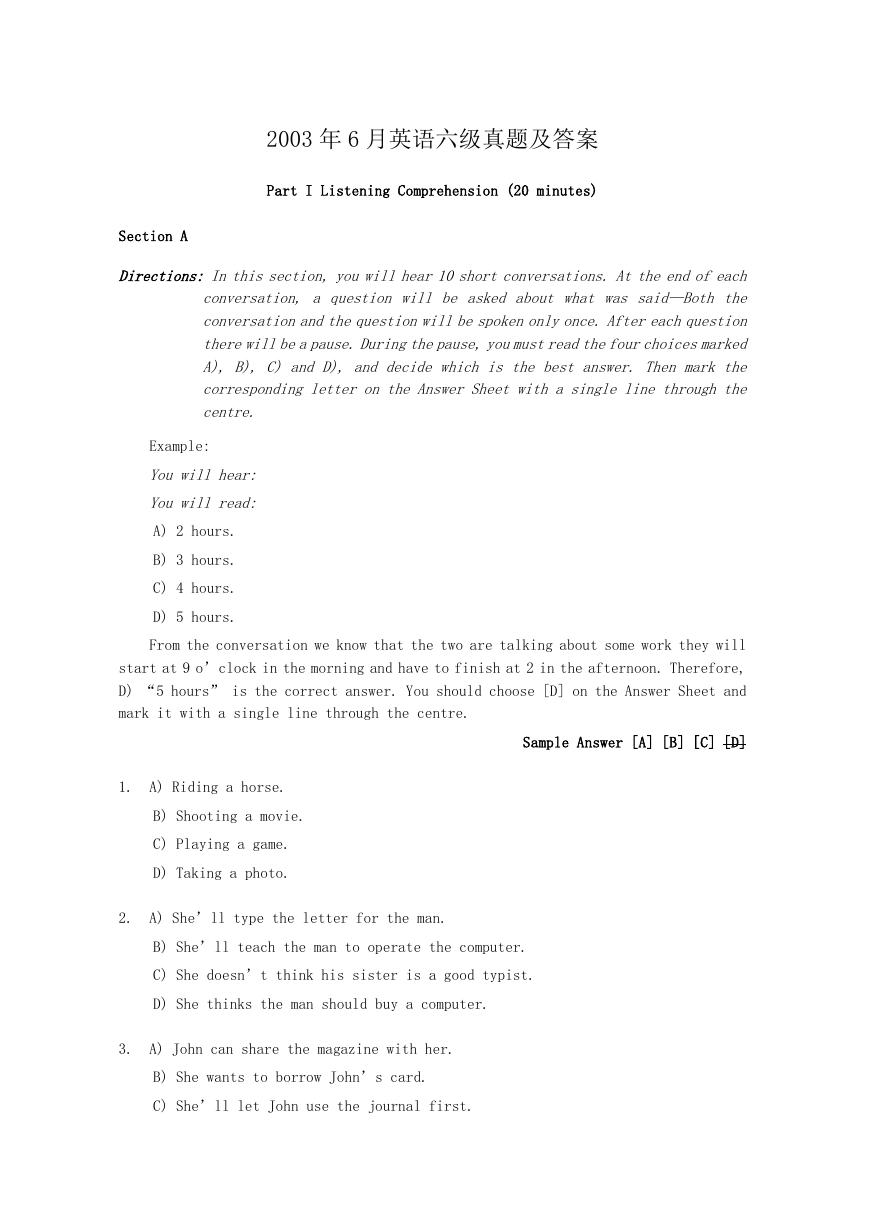
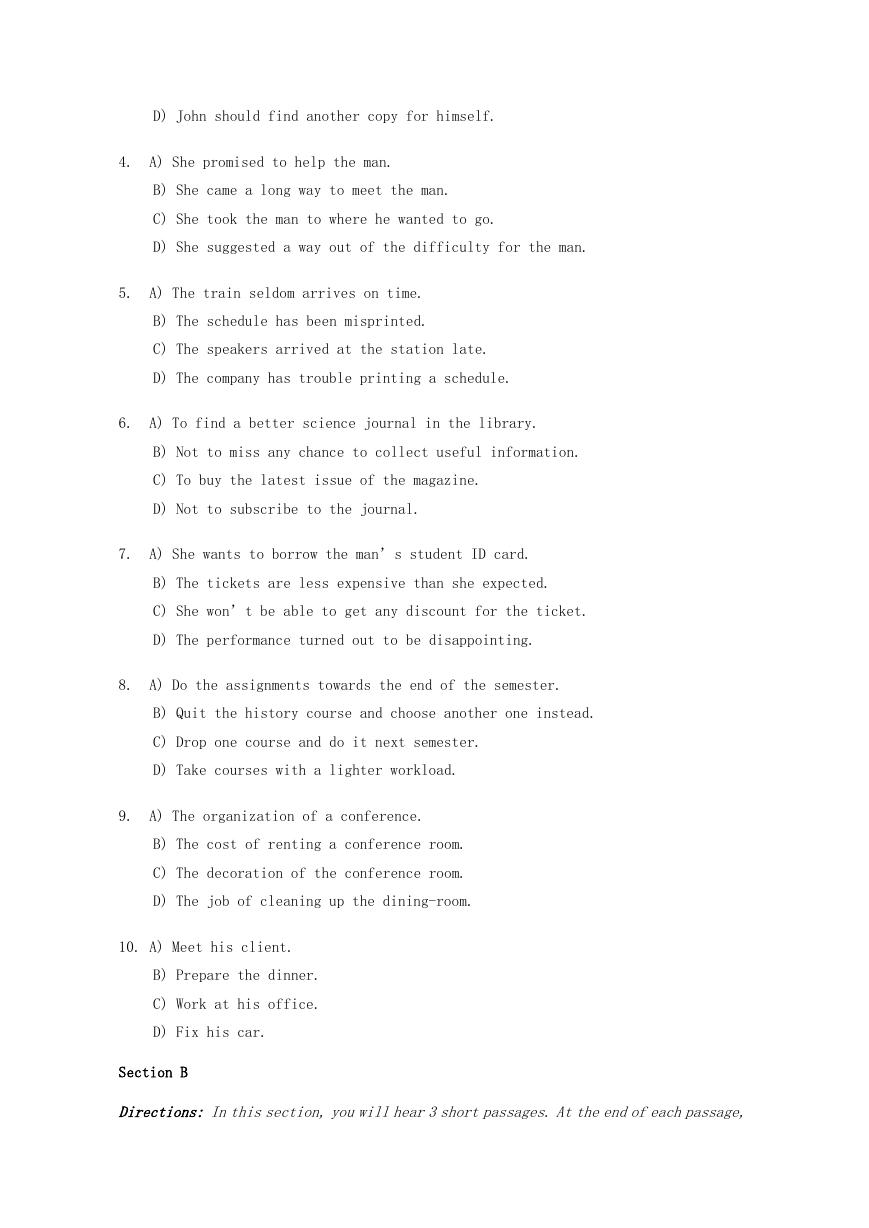
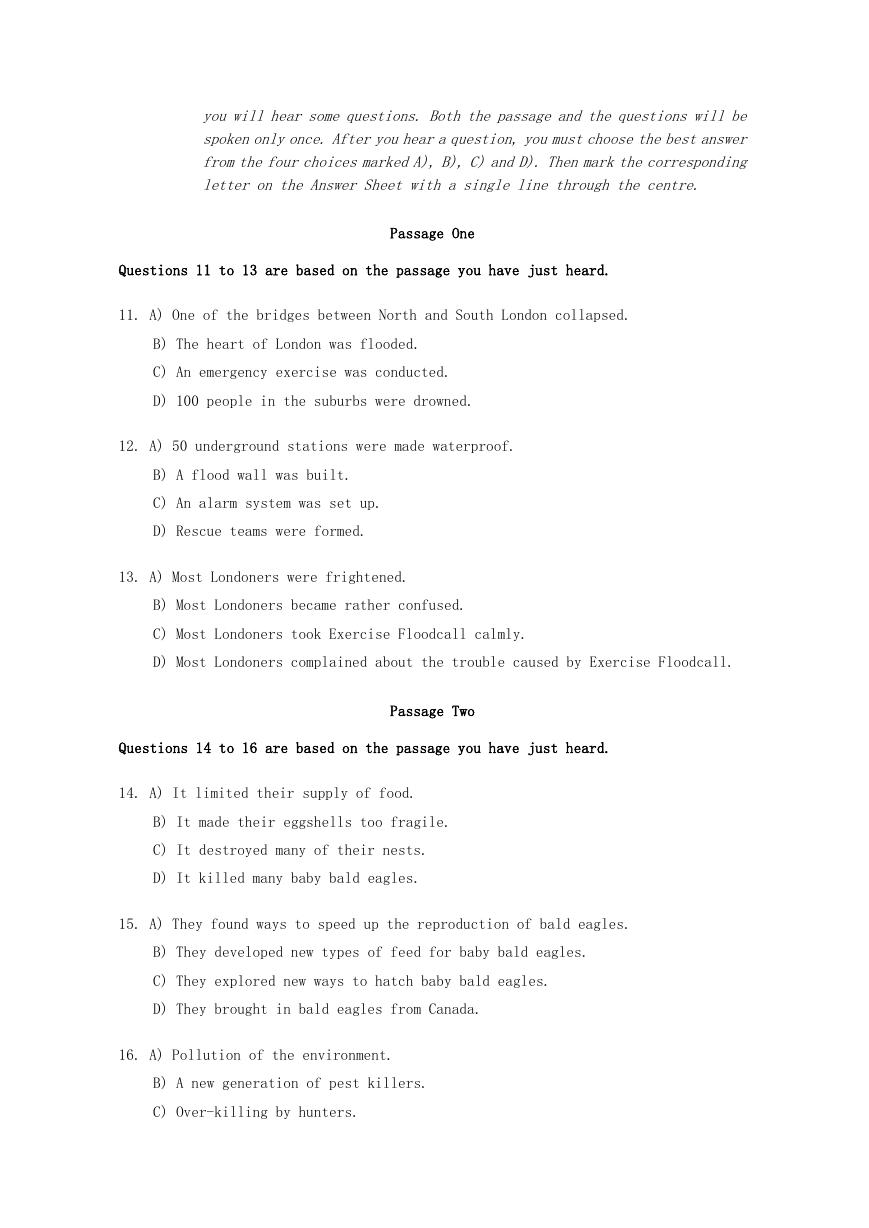
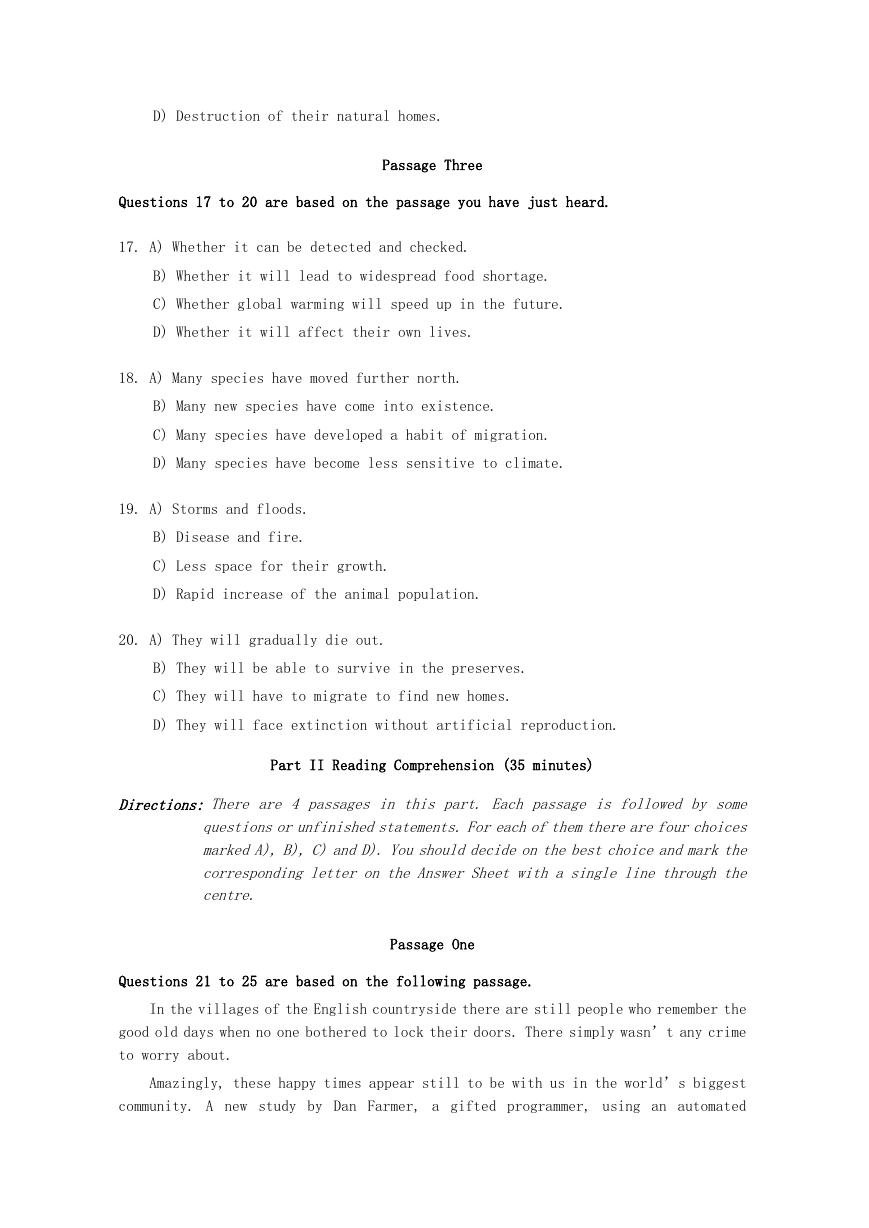
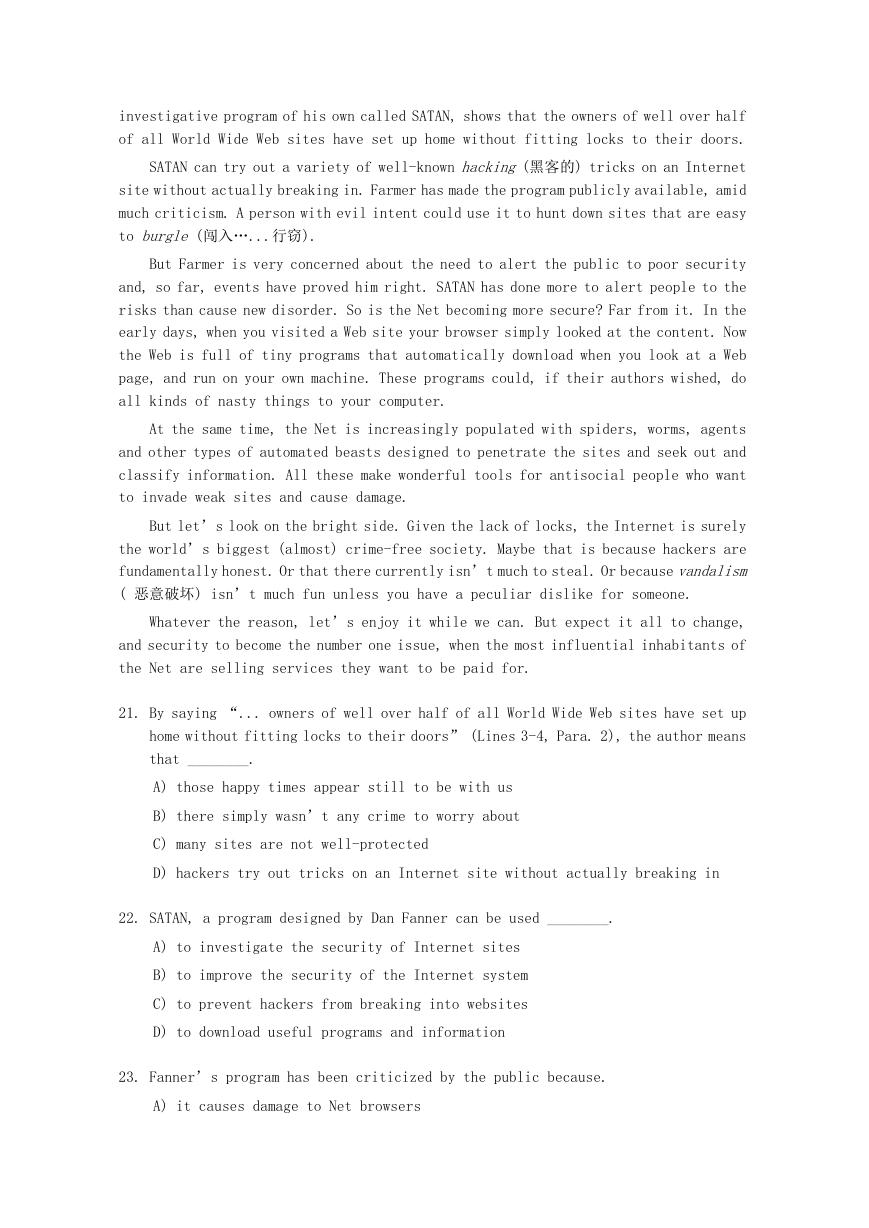
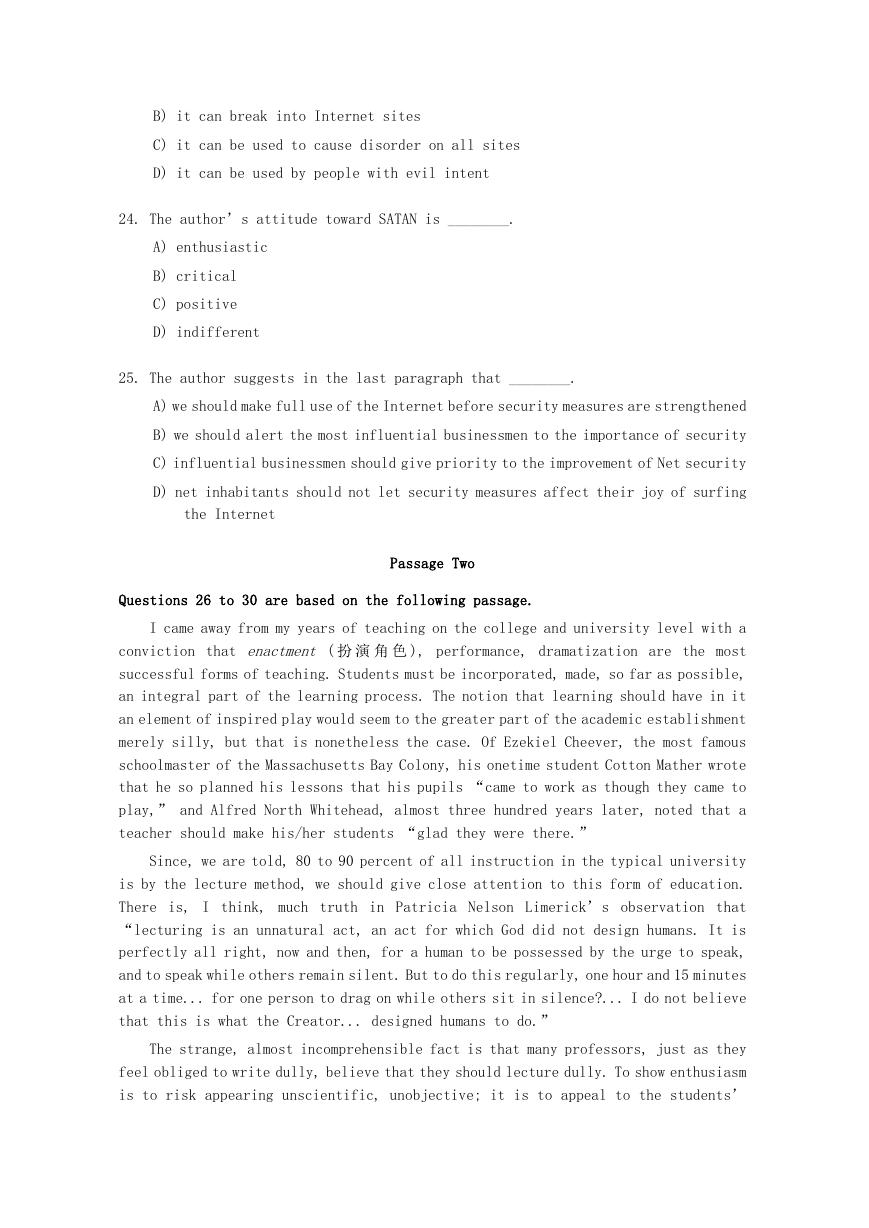
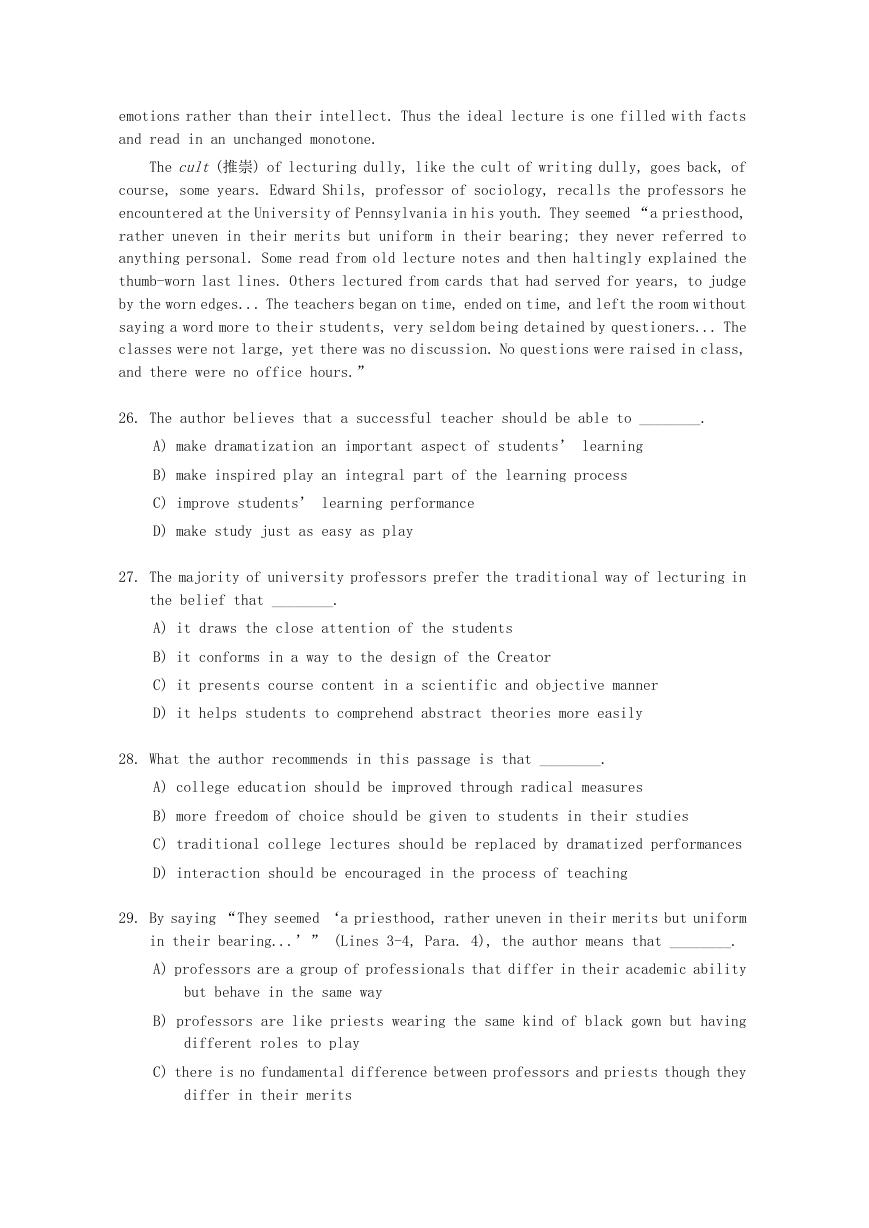
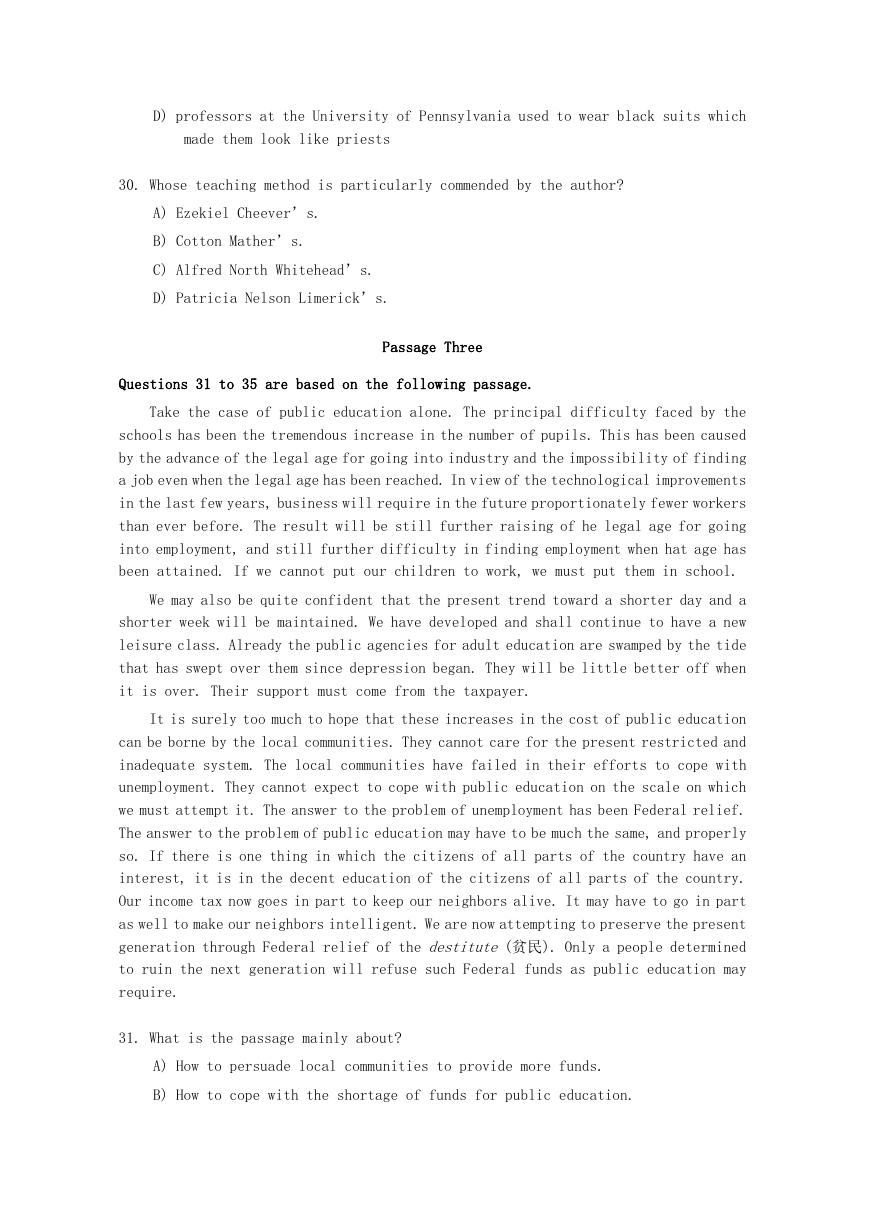








 2023年江西萍乡中考道德与法治真题及答案.doc
2023年江西萍乡中考道德与法治真题及答案.doc 2012年重庆南川中考生物真题及答案.doc
2012年重庆南川中考生物真题及答案.doc 2013年江西师范大学地理学综合及文艺理论基础考研真题.doc
2013年江西师范大学地理学综合及文艺理论基础考研真题.doc 2020年四川甘孜小升初语文真题及答案I卷.doc
2020年四川甘孜小升初语文真题及答案I卷.doc 2020年注册岩土工程师专业基础考试真题及答案.doc
2020年注册岩土工程师专业基础考试真题及答案.doc 2023-2024学年福建省厦门市九年级上学期数学月考试题及答案.doc
2023-2024学年福建省厦门市九年级上学期数学月考试题及答案.doc 2021-2022学年辽宁省沈阳市大东区九年级上学期语文期末试题及答案.doc
2021-2022学年辽宁省沈阳市大东区九年级上学期语文期末试题及答案.doc 2022-2023学年北京东城区初三第一学期物理期末试卷及答案.doc
2022-2023学年北京东城区初三第一学期物理期末试卷及答案.doc 2018上半年江西教师资格初中地理学科知识与教学能力真题及答案.doc
2018上半年江西教师资格初中地理学科知识与教学能力真题及答案.doc 2012年河北国家公务员申论考试真题及答案-省级.doc
2012年河北国家公务员申论考试真题及答案-省级.doc 2020-2021学年江苏省扬州市江都区邵樊片九年级上学期数学第一次质量检测试题及答案.doc
2020-2021学年江苏省扬州市江都区邵樊片九年级上学期数学第一次质量检测试题及答案.doc 2022下半年黑龙江教师资格证中学综合素质真题及答案.doc
2022下半年黑龙江教师资格证中学综合素质真题及答案.doc